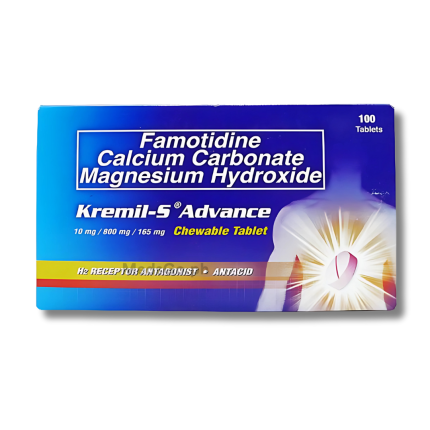All variations
Indications / Uses
Ingredients: Kremil S Advance contains Famotidine 10mg + Calcium Carbonate 800mg + Magnesium 165mg
Dosage / Direction
Do not use more than 2 chewable tablets in 24 hours.
Action
Pharmacology: This medicine contains famotidine, calcium carbonate and magnesium hydroxide. Famotidine, a histamine H2-receptor antagonist, reduces acid production in the stomach.
Calcium carbonate and magnesium hydroxide are antacids that neutralize acid in the stomach. This medicine also provides 321 mg calcium and 71 mg magnesium per chewable tablet.
Overdosage
There have been rare reports of milk-alkali syndrome (high levels of calcium) and tissue calcification (hardening of tissues) in patients receiving about 10 g calcium carbonate (4 g elemental calcium per day).
Administration
Special Precautions
If the patient have trouble or pain swallowing food, vomiting with blood, or bloody or black stools. These may be due to a serious condition and require consultation with the doctor.
If patient is using other acid reducers.
Had heartburn for more than three months; this may be a sign of a more serious disease of the stomach.
Frequent chest or shoulder pain with shortness of breath, lightheadedness, sweating, or dizziness.
Stomach pain, nausea and vomiting and unexplained weight loss.
Moderate (creatinine clearance < 50 mL/min) to severe (creatinine clearance <10 mL/min) kidney disease.
Do not take more than the recommended dose or duration of treatment.
Stop use and ask doctor if the patient needs to take this product for more than 14 days.
Do not use after the expiry date on the label.
Side-effects
Undesirable effects involving stomach and intestines include: constipation, diarrhea, nausea, vomiting, abdominal and gas-related discomfort, decreased appetite, dry mouth, heartburn, and loss of taste.
Famotidine may also cause the following skin reactions: acne, itching, red, itchy patches on the skin (hives), rash and dry skin.
Headache, dizziness, weakness, fatigue, muscle weakness, seizures, insomnia, drowsiness, depression, confusion, disorientation, anxiety, decreased sexual desire, and hallucinations have been reported.
Famotidine may also cause kidney problems (e.g., increased serum creatinine concentration and abnormal amounts of protein in the urine) and liver disease such as yellowing of the skin (jaundice).
Other undesirable effects include: fever, hypertension, flushing, muscle cramps, pain in the joints, ringing in the ears (tinnitus), and community-acquired pneumonia.
Antacids: Flatulence from increased carbon dioxide may occur in some patients.
Calcium carbonate can stimulate acid rebound in some people. Acid rebound causes stomach to produce even more acid, making heartburn worse. This, however, is very rare.
Excessive doses of calcium carbonate and magnesium hydroxide may result in high calcium and magnesium levels in the blood in patients with kidney impairment.
Alkalosis (excess base in body fluids) may also occur with excessive doses of antacid.
The combination of magnesium hydroxide and calcium carbonate balances the side effects of diarrhea from magnesium hydroxide and constipation from calcium carbonate.
Is it safe to take it with other drugs?
Unlike cimetidine, famotidine is considered to have little effect on the actions of other drugs such as warfarin, theophylline, phenytoin, diazepam, or procainamide.
Antacids may interact with other drugs such as propranolol, isoniazid, prednisolone, diflunisal, and naproxen which may cause formation of complexes that are not absorbed.
Antacids decrease the absorption of tetracycline and iron. Take tetracycline 1 hour before or 2 hours after antacids and 2 hours before or 3 hours after iron preparations and vitamin products that contain iron.
Storage
Features
- Calcium
- Famotidine
- Magnesium
Reviews
No reviews found
Questions about KREMIL-S ADVANCE 1 Tablet - OTC Antacid answered by pharmacists



